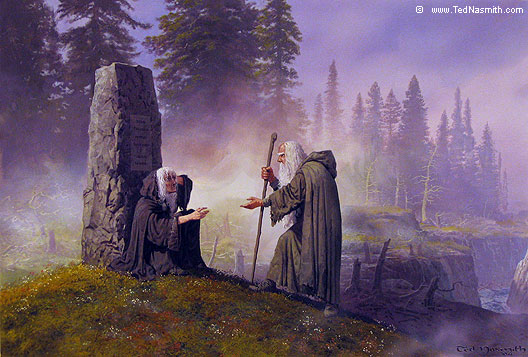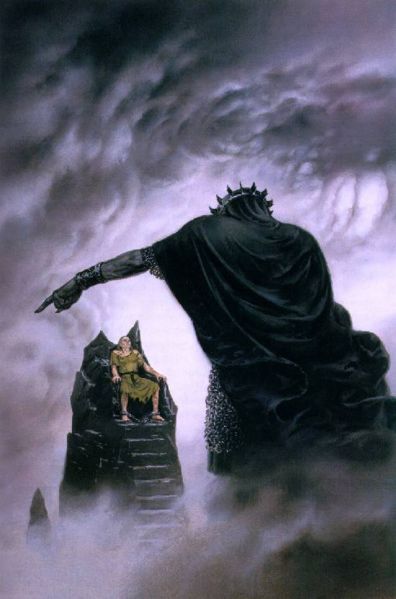‘Tol acharn!’: Part Two of “The Wanderings of Hurin”
Wednesday, June 3, 2009
posted by Deuce Richardson
 Print This Post
Print This Post
“He that sees through the eyes of Morgoth, willing or unwilling, sees all things crooked.”
From “The Wanderings of Húrin” by J.R.R. Tolkien
In my first post concerning Húrin, the mightiest mortal warrior of Middle-earth’s First Age, I looked at what befell him before he was released from his imprisonment in Angband. All of that was a prelude to the collection of writings that Tolkien entitled, “The Wanderings of Húrin,” which can be found in The War of the Jewels: The Later Silmarillion.
The tale begins in Angband, the ancient stronghold of Morgoth, wherein Húrin had been held captive for twenty-eight years, all the while being forced to witness Morgoth’s curse upon his family unfold, and always, always, viewing the events through the Dark Lord’s darkling mirror of spite and deceit. A year after the death of Túrin, son of Húrin, Morgoth deemed the time was ripe to unleash the embittered Húrin upon the world…
He feigned that in this he was moved by pity for an enemy utterly defeated, marveling at his endurance. ‘Such steadfastness,’ he said, ‘should have been shown in a better cause, and would have been otherwise rewarded. But I have no longer any use for you, Húrin, in the waning of your little life.’ And he lied, for his purpose was that Húrin should still further his malice against Elves and Men, ere he died.
Not trusting his erstwhile captor one whit, Húrin took leave of Angband, with a “great riding of the black soldiers of Thangorodrim” as escort. The Lord of Angband wished no harm to befall the former Lord of Hithlum. On the borders of the land he once ruled, Húrin was abandoned to his own devices, with a “great black staff” in his hand and girt with a sword.
Times had changed greatly in Hithlum. Easterlings, men who had allied with Morgoth, ruled there now. Húrin Thalion received a scant and cold welcome from his own people. It was known he had left Angband with the blessing of Morgoth. Like all others who ever made it out of the Hells of Iron, Hurin would be viewed with suspicion to the end of his days. Lurking in the wild hills of Hithlum were a pitiful band of men, more outlaws than rebels or liberators, led by one Asgorn. Upon a time, they had served under Túrin Turambar. Finding them, Húrin Thalion was not impressed.
‘Men are changed here. In thraldom they have found thrall hearts. I desire no lordship among them, nor elsewhere in Middle-earth. I will leave this land and wander alone, unless any of you will go with me, to meet what we may. For I have no purpose now, unless I find a chance to avenge the wrongs of my son.’
Húrin led Asgorn and six others to the hall of Lorgan, the Easterling ruler of Hithlum. As he stood before the fearful Lorgan, who was surrounded by henchmen, the indomitable Húrin had this to say:
‘Fear not!’ he said. ‘I should have needed no companions, if I had come to fight with you. I am come only to take leave of the lord of the land. I have no liking for it any more, since you have defiled it. Hold it while you may, until your Master recalls you to the slave-tasks that fit you better.’
Lorgan, still fearful, and sensing that Morgoth would not want Húrin hindered, could not resist wishing evil fortune and ill-faring upon the son of Galdor. Never one to suffer slights nor fools, Húrin delivered a pithy parting shot worthy of an Exeter, loaded with scorn and defiance, and a measure of prophecy in the bargain:
‘Tôl acharn!’ said Húrin. ‘Vengeance comes. I am not the last of the Edain, whether I fare ill or well.’ And with that he departed, and left the land of Hithlum.
Húrin led his men to the Brithiach River, near to Brethil, where they camped. Slipping away from them, Hurin crossed the river into Dimbar and made his way to the Echoriad, the mountains wherein he knew lay Turgon’s hidden city of Gondolin. Húrin could find no entrance to Turgon’s mountain-guarded realm, for the Lord of Gondolin had closed off all means of access to his land since the Battle of Unnumbered Tears. In that battle, Húrin and the men of Hithlum had saved Turgon and his people in the Fen of Serech, at a deathly cost. Despairing of entrance, Húrin called out to his old friend one last, heart-breaking time.
And he stood at last upon a great stone, and spreading wide his arms, looking towards Gondolin, he called in a great voice: ‘Turgon, Turgon! Remember the Fen of Serech!’ And again: ‘Turgon! Húrin calls you. O Turgon, will you not hear in your hidden halls?’
But there was no answer, and all that he heard was wind in the dry grasses. ‘Even so they hissed in Serech at the sunset,’ he said.
Tormented by dreams of his wife, Morwen, suffering and alone in Brethil, the land where their children had died, Húrin headed south. Unbeknownst to him, Asgorn and the others had already entered Brethil and been arrested by the men of Hardang, the new Warden of Brethil since the murder of his predecessor, Brandir, by Túrin Turambar. Hearing that Asgorn and the others were followers of Húrin, father of Turin, Hardang expelled Asgorn and the others from Brethil, but not before Asgorn had told him, “(Húrin) has returned, and we came with him to your borders. He has an errand here, he said. He will come!” The shadow of Morgoth’s curse had now entered Brethil and it lay heavy upon Hardang.
Húrin, starving and weary, came to Cabed Naeramarth in Brethil, the place where both his children had died. There he found Morwen, beside the standing stone erected by the folk of Brethil in memory of the Children of Húrin. And there Morwen died in his arms.

Stumbling away, blind with grief, Húrin collapsed near the ford of Teiglin, where he was found, half-conscious and exhausted, by men of Brethil whom Hardang had ordered to watch for Húrin. One of the men, Avranc, a henchman of Hardang’s, suggested killing the former lord of Hithlum in his sleep. Manthor, march-warden over all the men and a distant kinsman of Húrin’s, arrived before the idea went further, and rebuked Avranc.
Húrin, who had heard much of the men’s talk, though bemused and weary, regained his wits and stood before them.
“Curs!” he cried. “Would you slay an old man sleeping? You look like Men, but you are Orcs under the skin, I guess. Come then! Slay me awake, if you dare. But it will not please your black Master, I think. I am Húrin Galdor’s son, a name that Orcs at least will remember.”
Manthor calmed Húrin, somewhat, offering to lead him to Obel Halad, where stood the hall of Hardang. “Then lead me thither!” said Húrin. “I will go as I can. I have an errand to that house.”
Upon arriving in Obel Halad, Húrin and Manthor entered the hall of Hardang. They found Avranc, whom Manthor had ordered to stay at his post, had run ahead of them and warned the Warden of Brethil of their coming. Things went swiftly downhill from there. After making the famished and bone-tired Húrin stand for a time, Hardang finally gave the hero of a hundred battles a small stool to rest upon. The Warden followed this with several thinly-veiled insults. Húrin was not amused.
Then suddenly Húrin rose to his feet. ‘Well, Master Reed of the Bog,’ he said. ‘So you bend with each breath, do you? Beware lest mine blow you flat. Go take thought to stiffen you, ere I call on you again! Scorner of grey-hairs, food-niggard, starver of wanderers. This stool fits you better.’ With that, he cast the stool at Hardang, so that it smote him on the forehead; and then he turned to walk from the hall.
Húrin didn’t make it far. The ever-reliable Avranc was there, along with other henchmen, to bind the weakened hero. Hardang, bleeding but alive, ordered Húrin to be cast into the prison-caves nearby. Manthor went to him, offering to speak for him at the trial in two days. Húrin reluctantly agreed. Manthor returned the next day to find that Húrin was still asleep and that none were allowed to visit.
On the day of the trial, Húrin was led out, fettered hand and foot. Hardang appointed Avranc as judge. Húrin refused to speak until his shackles were struck off. Under pressure from Manthor (who many thought should be Warden of Brethil), Hardang ordered it done.
Then the fetters were struck off Húrin’s hands and feet. Straightway he stood up, and turning away from Avranc he faced the assembly. ‘I am here,’ he said. ‘I will answer my name. I am Húrin Thalion son of Galdor Orchal, Lord of Dorlómin and once a high-captain in the host of Fingon, King of the North-realm. Let no man dare to deny it! That should be enough. I will not plead before you. Do as you will! Neither will I bandy words with the upstart whom you permit to sit in the high seat. Let him lie as he will!’
‘In the name of the Lords of the West, what manner of folk are you, or to what have you become? While the ruin of Darkness is all about you, will you sit here in patience and hear this runagate guard ask for a doom of death upon me – because I broke the head of an insolent young man, whether in a chair or out of it? He should have learned how to treat his elders before you made him your Chieftain forsooth.’
‘Death? ‘Fore Manwe, if I had not endured torment for twenty years and eight, if I were as at the Nirnaeth, you would not dare to sit here to face me. But I am not dangerous any longer, I hear. So you are brave. I can stand up unbound to be baited. I am broken in war and made tame. Tame! Be not too sure!’ He lifted up his arms and knotted his hands.
Manthor then rose to speak, revealing that he had proof that Húrin had been drugged senseless on his second day of captivity. Amid the uproar, Húrin then accused Hardang of willfully allowing Morwen to starve and die. Suddenly, men were calling for Manthor to be Warden of Brethil and blood was spilled. Soon, Hardang’s hall was in flames and Hardang himself dead not long after. Morgoth’s shadow lay dark upon Brethil, brother killed brother and Húrin’s vengeance had come to the land of the Haladin. An arrow in the night struck down Manthor. He and Húrin exchanged words at the end:
‘Then, lord, use in peace the little more life that I have won for thee,’ said Manthor. ‘Do not bring your shadow upon others!’
‘Why, must I still not walk in the world?’ said Húrin. ‘I will go on until the shadow overtakes me. Farewell!’
So ends what JRRT appears to have intended to call (in Christopher Tolkien’s opinion) “The Shadow Falls on Brethil,” with Húrin’s further wanderings to Nargothrond and Doriath as separately-named “chapters” of some sort.
Once embarking upon this look at “The Wanderings of Húrin,” I simply could not find a way to discuss it in depth without the detailed summary above. Christopher Tolkien had to piece together the narrative from several textual sources. Even in that less-than-seamless form, the tale is only available in The War of the Jewels: The Later Silmarillion. Web-resources dealing with Húrin’s wanderings are almost non-existent, especially in regard to the son of Galdor’s sojourn in Brethil. I also wanted to showcase some of the excellent, late-period prose by Tolkien featured in this work. My next post in this series will follow Húrin to a lost treasure and the halls of the mightiest Elven-king in all of Middle-earth.
*Art by Ted Nasmith


